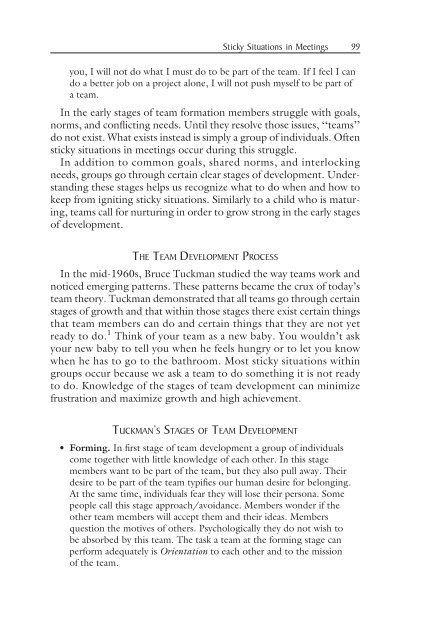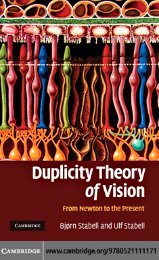Managing Sticky Situations at Work
Managing Sticky Situations at Work
Managing Sticky Situations at Work
You also want an ePaper? Increase the reach of your titles
YUMPU automatically turns print PDFs into web optimized ePapers that Google loves.
<strong>Sticky</strong> <strong>Situ<strong>at</strong>ions</strong> in Meetings 99you, I will not do wh<strong>at</strong> I must do to be part of the team. If I feel I cando a better job on a project alone, I will not push myself to be part ofa team.In the early stages of team form<strong>at</strong>ion members struggle with goals,norms, and conflicting needs. Until they resolve those issues, ‘‘teams’’do not exist. Wh<strong>at</strong> exists instead is simply a group of individuals. Oftensticky situ<strong>at</strong>ions in meetings occur during this struggle.In addition to common goals, shared norms, and interlockingneeds, groups go through certain clear stages of development. Understandingthese stages helps us recognize wh<strong>at</strong> to do when and how tokeep from igniting sticky situ<strong>at</strong>ions. Similarly to a child who is m<strong>at</strong>uring,teams call for nurturing in order to grow strong in the early stagesof development.THE TEAM DEVELOPMENT PROCESSIn the mid-1960s, Bruce Tuckman studied the way teams work andnoticed emerging p<strong>at</strong>terns. These p<strong>at</strong>terns became the crux of today’steam theory. Tuckman demonstr<strong>at</strong>ed th<strong>at</strong> all teams go through certainstages of growth and th<strong>at</strong> within those stages there exist certain thingsth<strong>at</strong> team members can do and certain things th<strong>at</strong> they are not yetready to do. 1 Thinkofyourteamasanewbaby.Youwouldn’taskyour new baby to tell you when he feels hungry or to let you knowwhen he has to go to the b<strong>at</strong>hroom. Most sticky situ<strong>at</strong>ions withingroups occur because we ask a team to do something it is not readyto do. Knowledge of the stages of team development can minimizefrustr<strong>at</strong>ion and maximize growth and high achievement.TUCKMAN’S STAGES OF TEAM DEVELOPMENT• Forming. In first stage of team development a group of individualscome together with little knowledge of each other. In this stagemembers want to be part of the team, but they also pull away. Theirdesire to be part of the team typifies our human desire for belonging.At the same time, individuals fear they will lose their persona. Somepeople call this stage approach/avoidance. Members wonder if theother team members will accept them and their ideas. Membersquestion the motives of others. Psychologically they do not wish tobe absorbed by this team. The task a team <strong>at</strong> the forming stage canperform adequ<strong>at</strong>ely is Orient<strong>at</strong>ion to each other and to the missionof the team.















